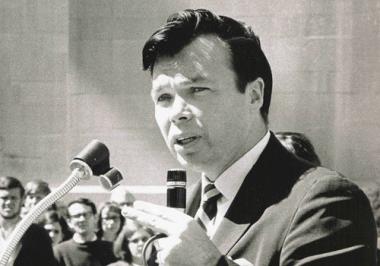It begins in 1963, with a woman bleeding to death in a hallway of Harlem Hospital, the victim of an attempted coat-hanger abortion. Bill Baird, a 31-year-old medical researcher, witnessed that horrible, unnecessary death. The experience, he now says, made him into an activist campaigning for women's rights in reproductive health.
Baird's description of that scene provides the opening moment, and a defining image, in A Menace to Society. Baird's pivotal but underappreciated role in the reproductive rights movement is the subject of the docudrama that premieres at UMass next week. The brainchild of UMass history professor Joyce Berkman, it's the result of a semester-long interdepartmental collaboration.
Archival research by eight History Department students, edited by dramaturg Emily Denison, has been dramatized by two MFA candidates in the Creative Writing program, Jeannie Hoag and Madeline Fitch. The staged reading will be performed in the Theater Department by an ensemble of 10 UMass students under the direction of Shawn LaCount, artistic director of Boston's Company One theater.
The piece revolves around a key moment in Baird's one-man crusade—his arrest during a speech at Boston University in 1967. At that time, it was a felony in Massachusetts to dispense birth control information or methods to unmarried people. The prohibition was contained in a statute with the quaintly chilling title Crimes Against Chastity, Morality, Decency and Good Order. In his B.U. appearance, Baird intentionally flouted the law by handing out packets of contraceptive foam—which he had purchased over the counter at Zayre's department store in Hadley.
Arrested and jailed, Baird appealed his conviction all the way to the Supreme Court, which in 1972 declared the Massachusetts law unconstitutional. Justice William J. Brennan wrote, "If the right of privacy means anything, it is the right of the individual, married or single, to be free from unwarranted governmental intrusion into matters so fundamentally affecting a person as the decision whether to bear or beget a child."
The case was a milestone in reproductive rights—not least for college students like those in that B.U. audience. Along with the Court's 1965 ruling in Griswold v. Connecticut, which had established the constitutional right of privacy in sexual matters, Eisenstadt v. Baird set the stage for the 1973 Roe v. Wade decision protecting abortion rights, in which the Baird case was cited as precedent.
Bill Baird was also the motive force behind another Supreme Court case, Belotti v. Baird, the 1979 decision that struck down Massachusetts' strict parental consent law for a minor seeking an abortion. These privacy precedents also figured in Lawrence v. Texas, the high court decision that overturned anti-sodomy laws and stands as a landmark in gay rights.
But A Menace to Society isn't a courtroom drama, though the play's title comes from a judge's opinion of Baird. At the core of the story lies the fact that while everyone knows about Roe, and Griswold is well remembered, Baird's victories don't figure much in the history of the movement. And the drama in the play comes from the "backstabbing," to use Baird's term, by the very people he expected to be his allies and supporters—in particular, the American Civil Liberties Union, Planned Parenthood and NOW, the National Organization for Women.
In the play, the ACLU declines to represent Baird because "We don't think the case has constitutional merits." The then-president of Planned Parenthood calls Baird's confrontation with the law "overenthusiastic," and states that the prevailing abortion laws, which Baird was also challenging, "will be changed by evolution and not by revolution." The script also reports that "Gloria Steinem, like many of her colleagues, has refused to shake his hand" and NOW's founder, Betty Friedan, "has called him irrelevant, and insinuated that he is a CIA agent."
Baird's rejection by the women's movement stemmed at least partly from a sense that he was an interloper in the arena of rights and freedoms that women were trying to carve out for themselves. While "Jane Roe" (Norma McCorvey) and Estelle Griswold are both women, a precedent-setting women's rights victory won almost single-handedly by a man doesn't fit the prevailing narrative. Moreover, Baird's focus on poor women, especially women of color, cut across the mostly white, largely middle-class makeup of 1970s feminism.
Even today, 40 years on, Friedan's CIA barb still riles Baird. That suspicion arose because NOW was wary of infiltration by its enemies, and Baird's vigilante activism fit a particular paranoid profile—the seeming supporter who grabs headlines with grand gestures in order to discredit the movement. Baird particularly resents the implied sexism in those accusations, pointing out that feminism has always had male allies, as well as its share of female antagonists, from Phyllis Schlafly to Sarah Palin.
Baird, who now lives in Western Massachusetts, is still speaking on the issues that have defined his life. He travels with a show-and-tell board he created in the '60s, when he was touring poor neighborhoods dispensing birth control information and supplies in a van which he had fitted out like a living room to make people feel comfortable. On one side of the board, painted with a skull and crossbones, are attached various implements used for back-alley abortions, including a coat hanger and a turkey baster for injecting caustic abortion-inducing solutions. The other side of the board displays an array of birth-control devices: condoms, pills, diaphragms, tubes of spermicidal gel, etc.
The UMass production marks another step toward establishing Baird's place in history. He has been a keynote speaker at several state-level NOW conferences in recent years, though he says the "backstabbing" continues at the national level. What's more, here and in two other states, an annual Right of Privacy Day proclaimed by the governor falls on March 22—the anniversary of the Supreme Court's Eisenstadt v. Baird decision.
A Menace to Society, Dec. 12-13, 7:30 p.m., Curtain Theater, UMass Fine Arts Center, (413) 545-2511 or (800) 999-UMAS, www.umass.edu/menacetosociety/play.html.



